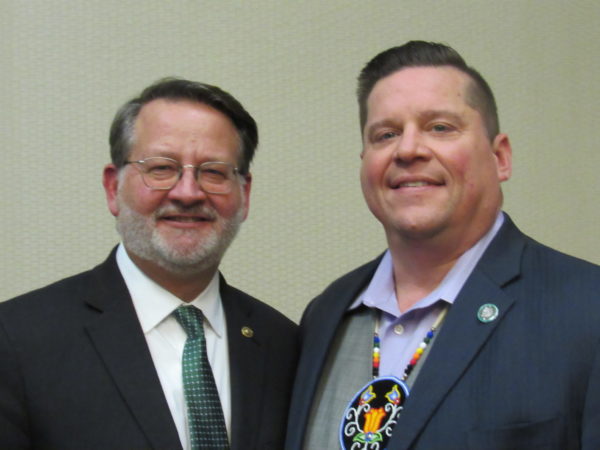
- Details
- By Native News Online Staff
LANSING, Mich. – Jamie Stuck, tribal chairperson of the Nottawaseppi Huron Band of the Potawatomi, was named by Michigan Governor Gretchen Whitmer on Monday to the Michigan Coronavirus Task Force on Racial Disparities.
The task force was created by Gov. Whitmer to address the disproportionate death rate of African Americans and other people of color that has become evident in Michigan during the COVID-19 (novel coronavirus) pandemic. While African Americans represent 13.6 percent of Michigan’s population, they represent a staggering 40 percent of the deaths from COVID-19.
The task force will act in an advisory capacity to the Governor and study the causes of racial disparities in the impact of COVID-19 and recommend actions to immediately address such disparities and the historical and systemic inequities that underlie them.
“COVID-19 has taken a disproportionate toll on Michigan’s communities of color and I am confident this task force will help us identify the factors driving this disparity and to identify actions we can take to create a more equitable Michigan for everyone,” Gov. Whitmer said. “Each of the task force members will provide a unique perspective and play a vital part in identifying these barriers and ensuring all Michiganders have equal access to critical resources when they need them most.”
“This appointment is an honor and an opportunity to provide awareness of the challenges that the sovereign nations within the state of Michigan have been faced with in the midst of the COVID-19 pandemic,” Chairperson Stuck told Native News Online.
The task force will investigate the causes of racial disparities in the impact of COVID-19, recommend actions to address those disparities, and suggest ways to:
- Increase transparency in reporting data regarding the racial and ethnic impact of COVID-19.
- Remove barriers to accessing physical and mental health care.
- Reduce the impact of medical bias in testing and treatment.
- Mitigate environmental and infrastructure factors contributing to increased exposure during pandemics resulting in mortality.
- Develop and improve systems for supporting long-term economic recovery and physical and mental health care following a pandemic.
While the COVID-19 related death toll is high among African Americans in Michigan, there are no confirmed deaths of American Indians from the deadly virus in the state. However, in Indian Country, American Indians have died from the deadly coronavirus in Indian Country. The hotspot in Indian Country for COVID-19 is on the Navajo Nation where as of Monday night, there were more than 1,300 confirmed cases and 45 coronavirus-related deaths.
In addition to serving as chairperson to his tribe, Stuck chairs the Education Committee and Journey to Wellness Committee. The Nottawaseppi Huron Band of the Potawatomi is a federally recognized tribe based in Athens, Michigan.
Stuck, the lone American Indian on the task force, joins two dozen others in the group that includes individuals for people of color organizations and corporations. The task force will stay intact until 90 days after the declared states of emergency and disaster end or as determined by Gov. Whitmer.
More Stories Like This
Native News Weekly (August 25, 2024): D.C. BriefsUS Presidents in Their Own Words Concerning American Indians
Native News Weekly (December 14, 2025): D.C. Briefs
Wounded Knee Massacre Site Protection Bill Passes Congress
Two Murdered on Colville Indian Reservation
Help us defend tribal sovereignty.
At Native News Online, our mission is rooted in telling the stories that strengthen sovereignty and uplift Indigenous voices — not just at year’s end, but every single day.
Because of your generosity last year, we were able to keep our reporters on the ground in tribal communities, at national gatherings and in the halls of Congress — covering the issues that matter most to Indian Country: sovereignty, culture, education, health and economic opportunity.
That support sustained us through a tough year in 2025. Now, as we look to the year ahead, we need your help right now to ensure warrior journalism remains strong — reporting that defends tribal sovereignty, amplifies Native truth, and holds power accountable.
 The stakes couldn't be higher. Your support keeps Native voices heard, Native stories told and Native sovereignty defended.
The stakes couldn't be higher. Your support keeps Native voices heard, Native stories told and Native sovereignty defended.
Stand with Warrior Journalism today.
Levi Rickert (Potawatomi), Editor & Publisher

